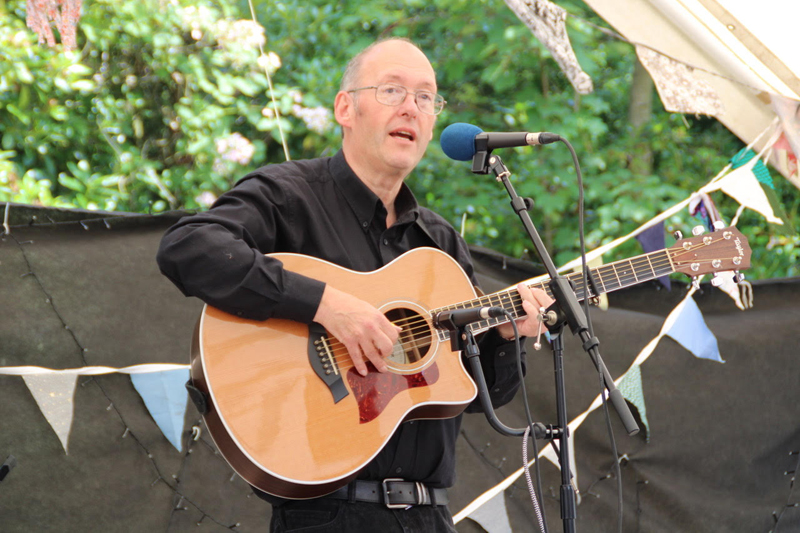To say that Mark Dowding is just a folk singer would be an understatement. Although he definitely does sing folk songs, he is also a historian and a dialect scholar and for every song he sings, he can give you the history of that song: who wrote it, the social climate at the time it was written and its meaning.
He is also a multi-instrumentalist, including amongst his collection, concertina, guitar, banjo and mandolin.
Mark Dowding was born in Ormskirk Hospital on January 16th 1961 and was the first child of John and Audrey. Dad, John was born in Bristol but his father, a tax inspector moved to various posts including Aberystwyth and Liverpool, where his office was in the iconic Liver Building.
In 1941 the family moved inland to Appley Bridge where they rented Finch House. John met Audrey Brown and married her in 1960. They set up home at Fairhurst Farm, Parbold.
In 1962 Mark got a little sister who was born on January 2nd and the family was complete. Mark’s dad sadly passed away in 2013, but his mum is still alive and his sister now lives in Connecticut in the USA.
I asked Mark what schools he went to and what sort of student he was. He told me:
“In those days there wasn’t anything like nursery school or pre-school to go to. You just went to the local school in the year of your 5th birthday, so I was 4 when I first attended Richard Dunning’s Endowed School at Bispham near Parbold.
“I was always good at reading but being left-handed, writing was a scrawl on the paper looking back!”
He went on to tell me that although there wasn’t the requirement as there once had been to write with your right hand, neither was there any help for writing with the left hand, which required a different technique.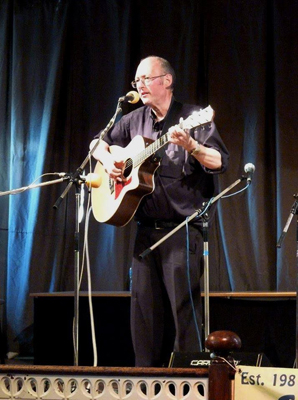
“I was OK with basic maths in Primary School. I wasn’t particularly fit when it came to games. I don’t think Ventolin was around as an inhaler and I took tablets and had another inhaler to use every day. I did try, but it was always a struggle, so I was never enthusiastic about taking part in sport.”
Secondary School for Mark was Ormskirk Grammar School and after the first year doing well in French, a change of teacher meant that went downhill after that. He was interested in music but didn’t take it at ‘O’ level because he chose the science route. He told me:
“If I had the chance again I might have gone a different route, although my future life would no doubt have changed dramatically or certainly differently.”
I asked Mark when he first realised he would like to be a performer and he said:
“During Primary School years, we all had a go at some sort of performance, whether it was in the Nativity play that usually took place each year in the infants or singing in assemblies or with programmes on the ‘wireless’ as we called it in those days.
“At some point, we were all in the hall singing whilst the headmaster would pass along listening to us all and would pick out the boys and girls who he thought would be good in the choir. I was lucky enough to be picked and we went along to another school to take part in either a competition or a concert; but other than that I have no recollection at all about where it was or what it was.”
I then asked why folk singing had become his particular performance genre and he replied:
“Although I wasn’t aware of the term, ‘folk song,’ at the time, the songs featured in the ‘Singing Together,’ (from my Primary School days), were just that – folk songs.
“I have a number of the pamphlets from the 1960s and 1970s that my friend’s mother, who was head teacher at Bispham after I left, found in the cupboard and wondered if I wanted them.
“At the time, The Spinners from Liverpool had an annual series on BBC TV for many years and they were singing some of the songs I’d learned at school. My dad brought home an LP of the Lancashire Folk group, The Fivepenny Piece and I started listening to that and learned some of the songs.
“I should add to that, when I was 11 my sister wanted a guitar for Christmas due to a colleague of my father’s showing her some chords on his guitar, and of course, because she wanted a guitar, I wanted one as well. My dad was working in London at the time and we both got guitars for Christmas. I spent the next five years locked in my bedroom learning to play it and my sister let hers gather dust.”
I thought now would be a good time to ask Mark about his first stage performance.
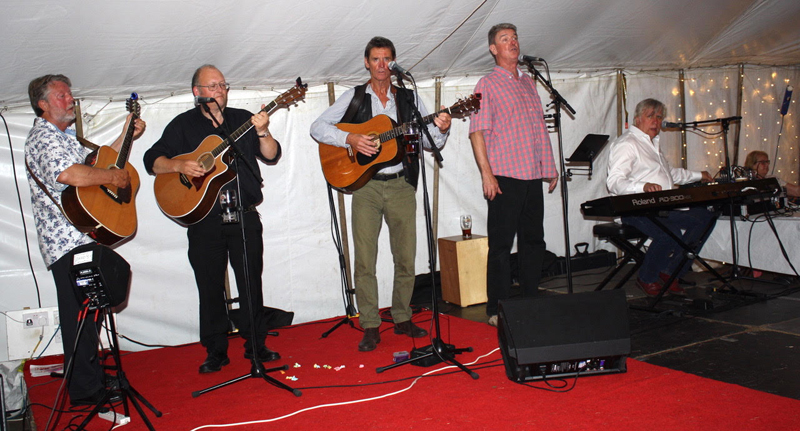
“When I was at Grammar school there was a guitar club that to be honest I didn’t bother with for a while – I don’t know why but I was doing my own thing at home. At one point I think I did go along with my guitar and found that a) I was good compared to the others and b) someone asked me if I’d like to join their group to play in a Parent Teacher Association concert at the school for raising funds. After a few rehearsals came the night of the concert and the group I was playing with did our fifteen minutes using some of the songs that I had learned along with the songs they knew, and the other groups did their own spots through the evening.
“One of the teachers came up to me with a record and suggested I listened to the songs and learned a few of them. This record was ‘Deep Lancashire’ and featured The Oldham Tinkers, which I’d heard of, and Mike Harding who I’d also heard of; but it also had a number of songs sung by a man called Harry Boardman. I didn’t know it at the time but Harry was to have a great influence on my musical ‘career’ over the next few decades.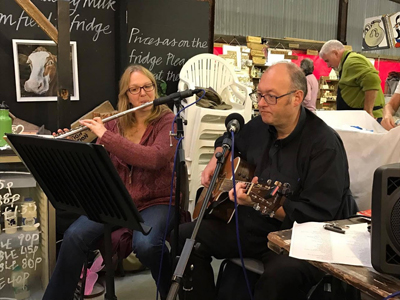
“I learned a few of these songs, found more LPs of Lancashire music and built up a repertoire over a few months.”
Then one of Mark’s friends at school announced that he was opening a Folk Club in Ormskirk and asked if he would like to go along and perform a few songs. Mark takes up the story:
“There was someone there that night who went to another club the night after on Friday not far from where I lived and offered to pick me up as I was unable to get there without transport. I also performed that night and again the audience were appreciative of what I did. I was having to learn a couple of songs a week to keep up at these two clubs and after I while I was able to repeat a song after a few weeks but add new songs that I’d learned. Eventually I was made a resident singer at this club on the Friday – The Dicconson Arms at Dangerous Corner in Wrightington. Basically a resident’s job was to support the club on a weekly basis and if enough other singers turned up to do “floor spots” then the residents maybe did one less song but if the floor spots didn’t turn up then the residents could do more songs to fill the time.
“I gathered that there was a network of folk clubs around the country and we had guests visiting the club from all over. Usually on a guest night, the residents would sing a few songs to warm the audience up before the guest did their spot. Watching the professional singers also helped me to improve my singing and playing technique as I could watch their fingers on the guitar and listen to how they sang – I was never trained to sing, although a few people have asked if I have had vocal training over the years. Listening to non-folk singers has also helped me improve my vocal technique. I like the singers from the early days – 1920s to the 1950s. My record/CD collection is quite eclectic and some people are surprised at what I sing sometimes from Music Hall to Nat King-Cole!”
After school, Mark attended Wigan technical college after “failing most of my A levels at school with honours,” where he did Building and Civil Engineering. He must have done well because at the end of his time there, he was awarded the year prize.
On leaving College, Mark did a course in Civil Engineering at Salford University. All didn’t quite go to plan though, as Mark relates:
“Most of it went over my head and I left after 3 years which included a year retaking the first year; but whilst I was there I found a few folk clubs in the area and went along. I mentioned Harry Boardman earlier.
“When I started at Salford there were plenty of things going on in Fresher’s Week to settle students down. I booked to see The Oldham Tinkers who were playing there and asked them where Harry Boardman’s folk club was in Manchester. They told me and that Saturday I went along with a like-minded friend that I’d met who had a car.
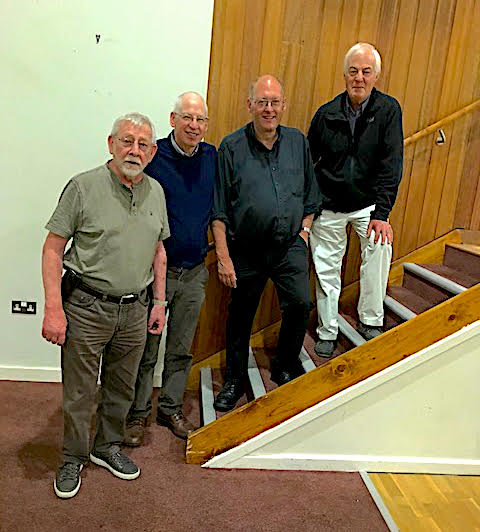
Mark with the Oldham Tinkers
“I had met Harry at a concert he did in Parbold and I was welcomed in and asked to do a couple of songs which again were well received. I went along on a regular basis and after a while I was asked if I’d like to be a resident singer which was quite an honour. I always say that I was the only one I’d never heard of as I was surrounded by people who I’d heard on records and had been around for years on the national folk circuit. Although I sang Lancashire songs, I rarely did any of the songs that Harry sang, as it wasn’t the done thing but I did sneak a few in on occasion. My repertoire was quite broad and included songs from all over the country, so I wasn’t hard pressed to find a different set of songs every week.”
Mark’s first job outside the folk circuit was with RM Douglas Construction who had an office in Wigan. It was during his time at Wigan Technical College, where he did a sandwich course and this was the job he got at that time. He was based in the estimating department but went on site to have a look what was going on at the various projects being undertaken at that time. He thinks it gave him a good grounding for later.
Mark’s dad suggested that he wrote to Balfour Beatty – the company he was working for at the time – and see if he could get a summer job.
He got the job and ended up in Ipswich, working on the Anglia East Railway Electrification Scheme. He was involved in installing the overhead cable lines from Liverpool Street Station in London to Norwich Station in Norfolk.
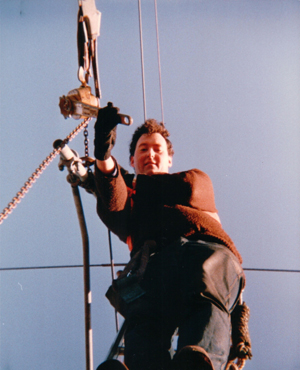
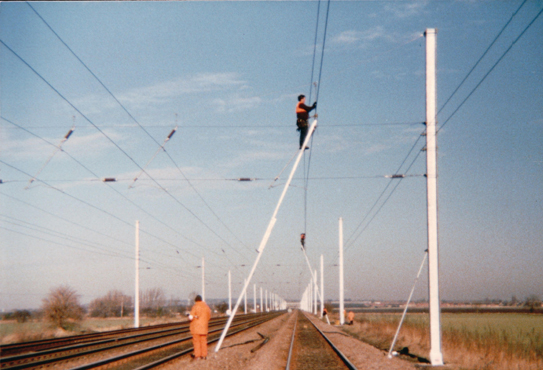
Mark doing his job on the
overhead cables. The picture on the right shows how far he fell.
When it was apparent that Mark wasn’t going to return to University, he asked if he could stay on as a full time employee and as he says: “For 36 years, I was doing a summer job!”
Ipswich had a folk club, which Mark visited every Thursday night while he was down there. Then over time he found himself based in Peterborough when a cable he was working on came adrift and he plummeted 20 feet, breaking his back in the process.
“To cut a long story short, I was in hospital for 14 weeks and spent a further three months recuperating before I was able to return to work.”
Because of his injuries, ladders were out of the question and Mark was given an office role as a technical clerk. Although it was different, Mark enjoyed learning new skills.
From Peterborough, Mark was sent up to Doncaster where he became a material control engineer, and then it was up to Kirkby near Liverpool to do work on the electrification of the Channel Tunnel from Folkestone to Calais. Their remit was from Folkestone to the centre of the tunnel. He told me:
“After that job finished others came along that kept the company going until the day came when we were told that redundancies were going to be made at the end of 2019 and unfortunately I was in the frame for the chop along with 20 or so other people. The time had come to make the decision based on my pension worth and I decided that I’d had enough and took my redundancy money, my lump sum and pension and left the company.”
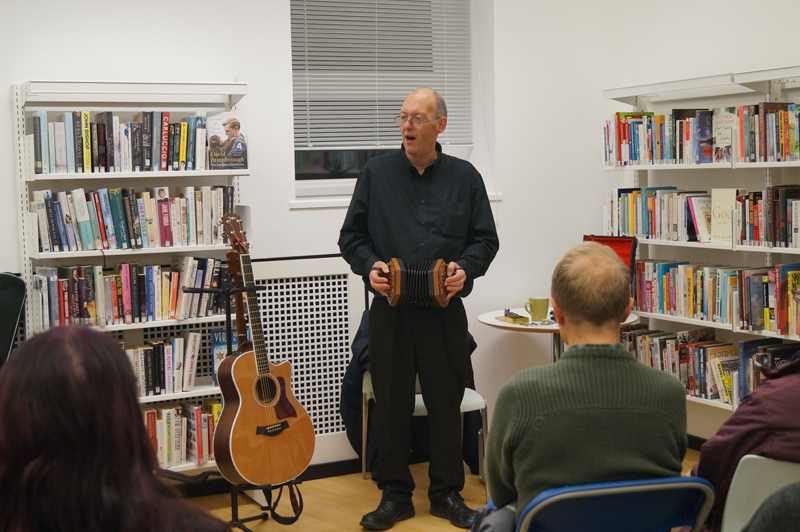
Mark performing at Oswaldtwistle Library in
2018
Leaving work meant that Mark could devote more time to the thing he loved most; his music. Furthermore, where he had been limited to the number of jobs he could take on; he was now free to do music full time.
He met his partner Maggi some years ago. I’ll let Mark tell the story:
“I met Maggi at the folk club that we now run together. The club that is now called Room at the Top (or Zoom at the Top since lockdown) started at The Rigbye Arms at High Moor near Parbold and I went once to that one as I was generally busy. For a couple of reasons the club moved down to the Railway Hotel pub in the centre of Parbold and I started going there on a more regular basis. It was renamed ‘Room at the Back’ as it was based in the back room of the pub. Maggi was a regular who used to come along with her then partner. When that partnership broke up we were both free agents and we eventually got together, bought a house and set up home selling our own respective houses to finance the new one.
“Whilst I have no children of my own, Maggi has two daughters and three granddaughters who treat me as their grandpa and I’m very proud of them.”
Things were going very well – until Covid 19. Then all the appearances were brought to a halt. Mark carried on undaunted though and still attends Folk Clubs via Zoom. It is not like the real thing though, and like many of us, he will be pleased when we are free to attend social events including concerts, plays and of course Folk Festivals; and when he can once more perform to a live audience.
Although Mark mainly performs on his own, during his time in Peterborough, he played with Peterborough Big Band, and now plays regularly with Lancashire historian and performer, Sid Calderbank where they call themselves Tacklers’ Tales when they perform.
I have had the pleasure of seeing Mark perform on several occasions, three of which, I booked him for and he is the perfect entertainer. He tells his audience a brief history of some of the songs and performs them beautifully. I would like to thank him for allowing me this interview and wish him continued success in the future.
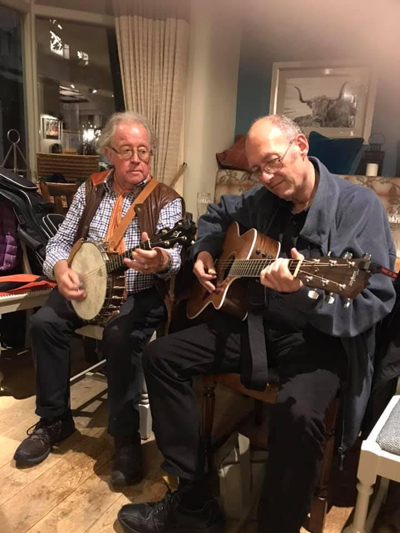
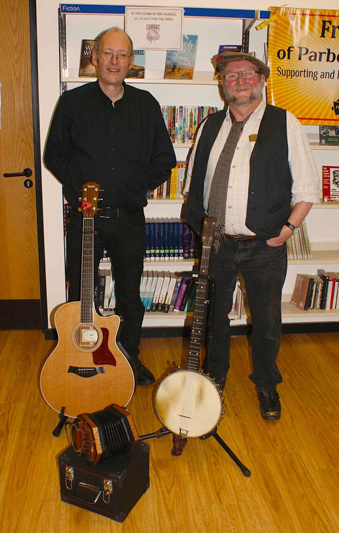
Pictures: Left - Mark with Mike
Harding. Right: Mark with Sid Calderbank
© Peter Jones 2021. Pictures courtesy of Mark Dowding. Oswaldtwistle
Library Peter Jones
You can see Mark in action in a video I took of him when he appeared
at Oswaldtwistle Social Club in 2015
by following this link:
https://www.youtube.com/watch?v=8QC3sqqf0Gw&t=447s
|

